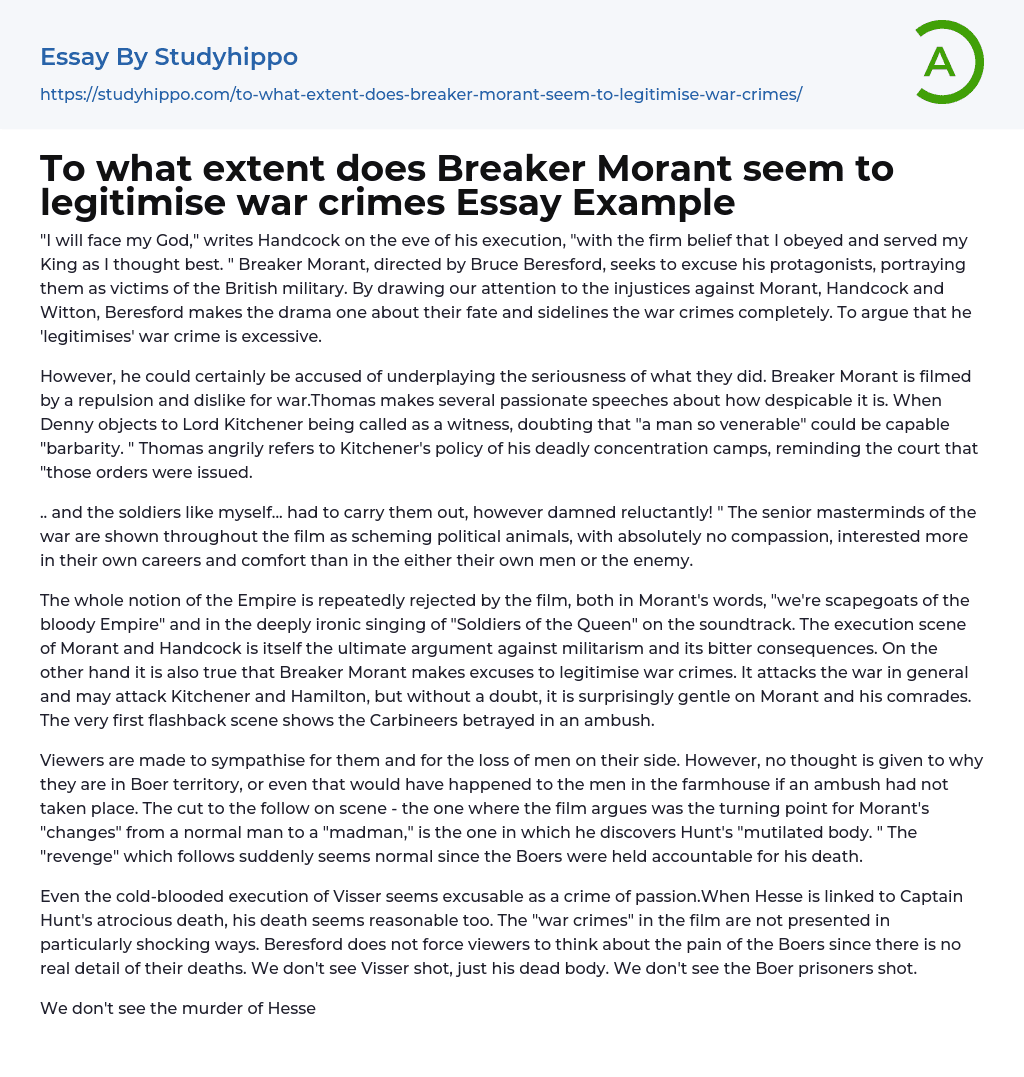

To what extent does Breaker Morant seem to legitimise war crimes Essay Example
Handcock expresses his conviction that he served his King to the best of his abilities, as he faces his impending execution. The film, Breaker Morant, helmed by Bruce Beresford, endeavors to defend the accused, depicting them as sufferers of the British military. Beresford highlights the wrongdoings against Handcock, Morant, and Witton, pivoting the narrative towards their destiny and overshadowing the violations committed during war. The assertion that Beresford endorses war crimes is exaggerated.
Despite his repulsion towards war depicted in the film Breaker Morant, Thomas could be criticized for downplaying the severity of their actions. Throughout the movie, Thomas delivers fervent speeches condemning war, while Denny disputes the possibility of Lord Kitchener testifying due to his esteemed reputation. In response, Thomas vehemently reminds the court of Kitchener's involvement in deadly concentration camp
...s, citing his orders as evidence.
Despite our reluctance, soldiers like myself had to carry out the orders. The film portrays the senior figures behind the war as political manipulators who lack compassion. They prioritize their own careers and comfort over the well-being of their troops and even the enemy.
The idea of the Empire is repeatedly rejected in the film, with Morant stating "we're scapegoats of the bloody Empire" and "Soldiers of the Queen" sung ironically on the soundtrack. The execution of Morant and Handcock serves as a powerful argument against militarism and its harsh consequences. However, Breaker Morant also attempts to justify war crimes. While the film criticizes war in general and possibly Kitchener and Hamilton, Morant and his companions are treated kindly. The opening flashback depicts the Carbineers betrayed in an ambush.
The film elicits sympathy from viewers for the loss of
men on their side and the characters themselves. However, there is no explanation as to why they are in Boer territory or consideration of what could have happened if an ambush did not take place at the farmhouse. The pivotal moment in Morant's transformation into a "madman" is depicted when he finds Hunt's mutilated body, which triggers his revenge against the Boers who he holds accountable for Hunt's death.
The execution of Visser and Hesse's death are viewed as justifiable crimes of passion. The presentation of "war crimes" in the film lacks shock value and does not highlight the pain of the Boers due to the absence of specific details of their deaths. The audience is not shown Visser or the Boer prisoners being shot, only their lifeless bodies are seen. Beresford's approach eliminates the need for viewers to contemplate the suffering of the Boers.
We do not witness the explicit murder of Hesse, but rather we see only a brief shot of his body with his eyes open. This moment is distinctly separate from the scene where we see Handcock firing the deadly shot from far away. The attention is consistently on Morant and his comrades, shifting away from the individuals who suffered because of their actions. The movie aims to prove that "war changes men's natures," and the brutality of war makes it impossible to pass judgment. Thomas's defense of the three offenders is based on the notion that "we cannot hope to judge such matters unless we, ourselves, have been submitted to the same."
It is the men on trial who are being accused of provocation. Beresford does not excuse the immorality of
war crimes but concedes that Witton is worried about Visser's shooting and distressed by the execution of the Boers who surrendered. Morant also expresses unease when informed by Taylor that they should not take prisoners. Nevertheless, we are troubled as we witness Taylor killing the Boers in the field, which may explain why the prosecution's case cannot be fully dismissed.
Thomas acknowledges that the murders were committed and confirms that Breaker Morant does not justify war crimes by suggesting that anything goes in war. The movie does not condone shooting unarmed prisoners of war but does challenge the ethics of the 'take no prisoners' directive.
Acknowledging the ultimate barbarity of war, Beresford places greater emphasis on the injustices of war, resulting in a lessened view of the crimes committed by those involved. Instead, our concern is directed towards the "normal men" who commit these crimes under the belief that anything is justified in such an "abnormal situation," making the tragedy and horrors seem less significant to us.
- Animal Cruelty essays
- Law Enforcement essays
- Juvenile Justice System essays
- Surveillance essays
- Forensic Science essays
- Crime Prevention essays
- Criminal Justice essays
- Criminology essays
- Drug Trafficking essays
- Juvenile Delinquency essays
- Organized Crime essays
- Penology essays
- Prison essays
- Property Crime essays
- Punishment essays
- Serial Killer essays
- Sexual Offence essays
- Victim essays
- Crime scene essays
- Punishments essays
- Charles Manson essays
- Juvenile Crime essays
- Piracy essays
- Stealing essays
- Gang essays
- Hate Crime essays
- Homicide essays
- Damages essays
- Murder essays
- Robbery essays
- Ted Bundy essays
- Prostitution essays
- Violent crime essays
- Rape essays
- Identity Theft essays
- Sexual Harassment essays
- Distracted Driving essays
- Drunk Driving essays
- Detention essays
- Sexual Assault essays
- Sexual Assault on College Campuses essays
- Cyber Crime essays
- White Collar Crime essays
- Fur essays
- Federal Bureau Of Investigation essays
- Fire Department essays
- Criminal Justice System essays
- Commitment essays
- Mass Incarceration essays
- Kill essays



